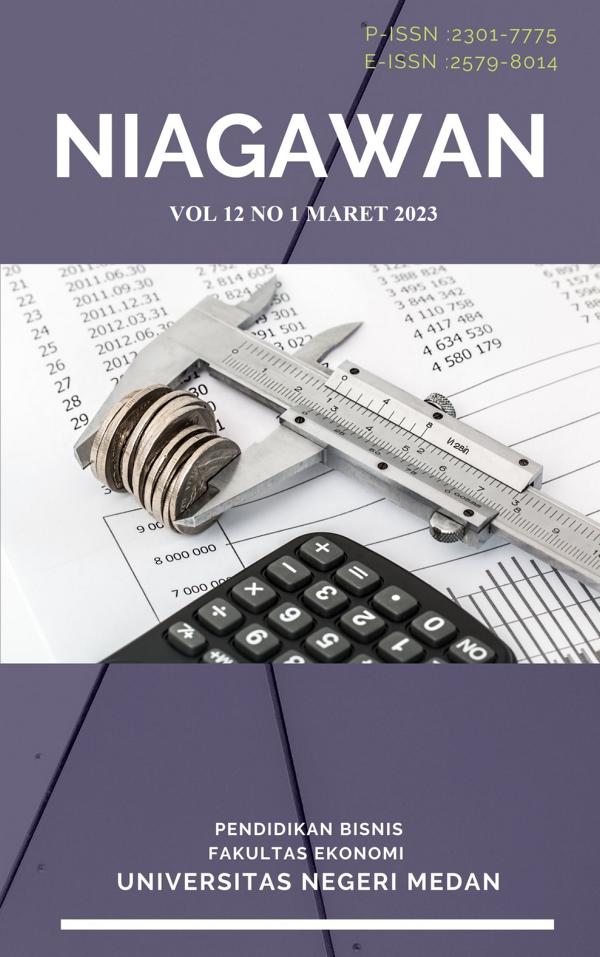PENGARUH SELF EFFICACY DAN LOCUS OF CONTROL DALAM MENINGKATKAN KINERJA KARYAWAN DI CASSANO CAFÉ MEDAN
DOI:
https://doi.org/10.24114/niaga.v12i1.43865Keywords:
Self Efficacy, Locus of Control, Employee PerformanceAbstract
Human resources are one of the most important assets in a company or business, so entrepreneurs must pay special attention to these human resources in order to be able to improve the performance of human resources themselves. The purpose ofthis research is to determine the effect of Self Efficacy and Locus of Control on Employee Performance at Cassano Café. The population and sample in this study were 30 respondents with a saturated sample. Data collection techniques using observations, questionnaires, and interviews. Data analysis techniques use multiple linear analysis. The results of multiple linear regression analysis are Y = 11.137 + 0.795X 1 + 1.055X2 + e. The results of partial test research (t) show that Self Efficacy has a positive and significant effect on Employee Performance, Locus of Control also has a positive and significant effect on Employee Performance. The results of simultaneous test research (F) show that Self Efficacy and Locus of Control have a positive and significant effect on Employee Performance. The result of the coefficient of determination of 69.8% for Employee Performance, while the remaining 32.5%, was influenced by other factors outside of this study.References
Alwi, W. S. (2013). Psikologi Kepribadian dalam Organisasi (Ketiga). Universitas Muhammadiyah Malang Press.
Ary, I. R., & Sriathi, A. A. A. (2019). Pengaruh Self Efficacy Dan Locus of Control Terhadap Kinerja Karyawan (Studi Pada Ramayana Mal Bali). E-Jurnal Manajemen Universitas Udayana, 8(1), 30. https://doi.org/10.24843/ejmunud.2019.v08.i01.p02
Ghufron, & Risnawati. (2015). Teori-Teori Psikologi. Ar-Ruzz Madia.
Hanurawan. (2014). Psikologi Sosial Suatu Pengantar. PT Remaja Rosdakarya.
Hardianto, G. (2014). Hubungan Antara Self-efficacy Akademik Dengan Hasil Belajar Siswa. Jurnal Konselor, 3(1).
Inawati, & Susilowati, J. (2016). Analisis Pengaruh Self Efficacy dan Locus of Control Terhadap Kinerja Guru dengan Komitmen Profesional sebagai Mediasi (Studi pada SMA Negeri 1 , 2 , 3 , 4 dan 5 Kota Semarang ) Inawati Program Pascasarjana Universitas Stikubank Semarang Jeje Susilowati. Ekonomi, 13, 135“143
Istiono, D. (2020). Pengaruh Self Efficacy dan Locus Of Control Terhadap Kinerja Karyawan Dengan Kepribadian Sebagai Variabel Moderating (Studi Pada Pt. Wijaya Karya Beton, Tbk Ppb Majalengka). Entrepreneur: Jurnal Bisnis Manajemen Dan Kewirausahaan, 1(1), 1“13. https://doi.org/10.31949/entrepreneur.v1i1.876
Kasmir. (2016). Manajemen Sumber Daya Manusia (Teori dan Praktik). PT. Raja Grafindo Persada.
Mathis, Roberth, J. (2011). Human Resource Management (Kesepuluh). Salemba.
Musfufa. (2020). Pengaruh Keterampilan, Pengalaman Kerja dan Lingkungan Kerja Terhadap Kinerja Karyawan Pada CV. Bonanza Motor Babat Lamongan. Jurnal Ekonomi, 1(2), 1“3.
Pulungan, P. I. S., & Rivai, H. A. (2021). Pengaruh Locus of Control Dan Efikasi Diri Terhadap Kinerja Karyawan Dengan Keterikatan Karyawan Sebagai Variabel Intervening Pada PT Semen Padang. Jurnal Menara Ekonomi : Penelitian Dan Kajian Ilmiah Bidang Ekonomi, 7(1), 54“65. https://doi.org/10.31869/me.v7i1.2539
Puspitanigsih, F. (2014). Pengaruh Efikasi Diri Dan Pengetahuan Kewirausahaan Terhadap Minat Berwirausaha Melalui Motivasi. Jurnal Ekonomi Pendidikan Dan Kewirausahaan, 4(1).
Situmorang, I. R. (2021). Pengaruh Pelaksanaan Pelatihan dan Tingkat Disiplin Kerja dalam meningkatkan Kinerja Karyawan Pada PT. Jasa Raharja (Persero). Manajemen Dan Bisnis, 8(1), 15“29. https://doi.org/https://doi.org/10.47663/jmbep.v8i1.225
Downloads
Published
Issue
Section
License
Authors who publish in this journal agree to the following terms:
- Authors retain copyright and grant the journal the right of first publication, with the work simultaneously licensed under a Creative Commons Attribution License that allows others to share and adapt the work with an acknowledgment of the work's authorship and initial publication in this journal.
- Authors can enter into separate, additional contractual arrangements for the non-exclusive distribution of the journal's published version of the work, with an acknowledgment of its initial publication in this journal.
- Authors are permitted and encouraged to post their work online before and during the submission process, as it can lead to productive exchanges and earlier and greater citation of published work. Where authors include such work in an institutional repository or on their website, we request that they include a statement acknowledging the Jurnal Perspektif Pembiayaan dan Pembangunan Daerah, including the name of the journal, the volume number, and a web link to the journal item.
- Authors should be aware that the Creative Commons Attribution 4.0 International License (CC BY 4.0) permits readers to share (copy and redistribute the work in any medium or format) and adapt (remix, transform, and build upon the work) for any purpose, even commercially, provided they also give appropriate credit to the work, provide a link to the license, and indicate if changes were made. They may do these things reasonably but not in any way that suggests the author or the publisher endorses their use.
NIAGAWAN by Program Studi Pendidikan Bisnis Fakultas Ekonomi Universitas Negeri Medan is licensed under CC BY-NC 4.0





